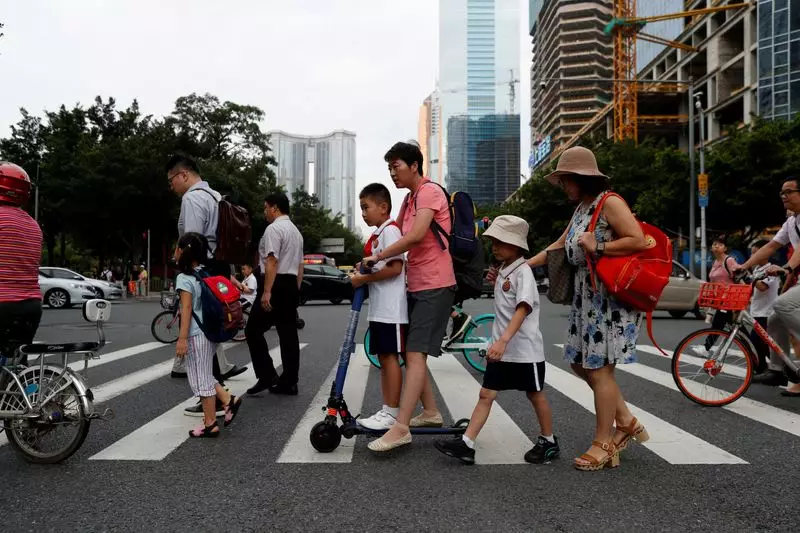As China’s educational landscape continues to evolve, recent changes hint at a quieter, yet significant relaxation of the stringent regulations imposed on the private tutoring sector. This shift marks a departure from the rigid policies enforced during the last three years, illustrating a nuanced adaptation of government strategies aimed at stimulating economic growth and addressing rising unemployment among youth.
In 2021, the Chinese government implemented a noteworthy initiative referred to as the “double reduction” policy. This set of regulations aimed to alleviate the financial burdens facing parents and students by curtailing for-profit tutoring in core subjects. In the aftermath, the industry saw its market value plummet, resulting in massive layoffs and a drastic decline in enrollment. However, recent insights from industry experts and data suggest a gradual resurgence of private tutoring operations, as the government appears to signal a readiness to support the sector once more.
The current economic climate in China, characterized by stagnant growth and an oversaturated job market for new graduates, has compelled policymakers to reconsider their stance on the educational sector. Encouraging private educational services is viewed as essential for job creation in a nation where millions of young people entering the workforce are struggling to find opportunities. In this context, the easing of policy restrictions within the tutoring industry can be seen as a vital economic strategy.
Parents across China are acclimatizing to the new dynamics within the tutoring space. Interviews with several families indicate a growing optimism associated with the gradual liberalization of private tutoring services. For example, one parent, Michelle Lee, shared her ongoing commitment to invest substantially in her children’s education despite the tumultuous regulatory environment. She expressed satisfaction with the more transparent operations of tutoring institutions compared to the discreet business practices adopted immediately after the “double reduction” policy was enforced.
Much of this adaptability stems from the deep-seated pressure embedded within China’s educational system, where competition to excel is intense. Many parents perceive private tutoring as an essential supplement to their children’s academic performance, equating success with access to additional resources. This sentiment often drives families to seek out tutoring alternatives, regardless of the restrictions imposed by the government.
While a formal policy overhaul remains absent, government attitudes have noticeably softened regarding private tutoring. Recent pronouncements from officials suggest a recognition of the critical role that tutoring services play in supporting educational outcomes and economic stability. For instance, officials have articulated that specific “pain points” in educational policy are being addressed, hinting at a broader pivot towards policies that foster educational growth.
The most significant development occurred when the State Council, China’s cabinet, included educational services in a comprehensive plan aimed at bolstering domestic consumption. This move was well-received across the industry and led to a notable rise in the stock values of educational firms, showing that the market is hungry for positive news and governmental support.
Furthermore, loosened regulatory scrutiny has been reflected in operational practices by tutoring companies. Many are observing a decrease in inspections and a more accommodating regulatory environment, leading to a renewal of business activities post-crackdown.
Amidst the evolving regulatory landscape, tutoring companies have demonstrated remarkable resilience. Many have adopted innovative curriculum adaptations to navigate the limitations posed by the government, offering classes under alternative guises. For instance, subjects like mathematics are often rebranded as “logical thinking,” allowing companies to continue providing educational services without breaching regulations.
One anecdote speaks to this creativity: a tutoring school in Zhejiang transformed its course offerings to focus on science-related subjects taught in English, successfully sidestepping the core curriculum restrictions. This adaptability has enabled numerous tutoring firms to survive, albeit with ongoing vigilance regarding compliance with governmental guidelines.
Despite signals of a budding recovery, the future of China’s private tutoring sector remains uncertain. While the easing of regulations may offer essential relief, both companies and parents remain acutely aware of the potential for sudden reversals in policy. This lingering caution highlights the necessity for ongoing collaboration between educational businesses and governmental authorities to maintain a stable environment for private education.
As the Chinese government re-evaluates its regulations on private tutoring, the shift towards a more supportive stance could potentially lead to an invigorated industry. The interplay between educational demand and economic objectives will undoubtedly shape the future trajectory of tutoring services in China, providing both opportunities and challenges in the years to come.

